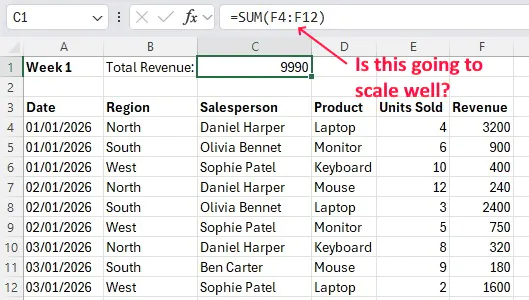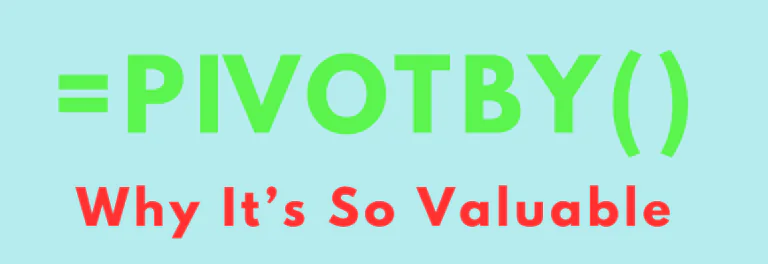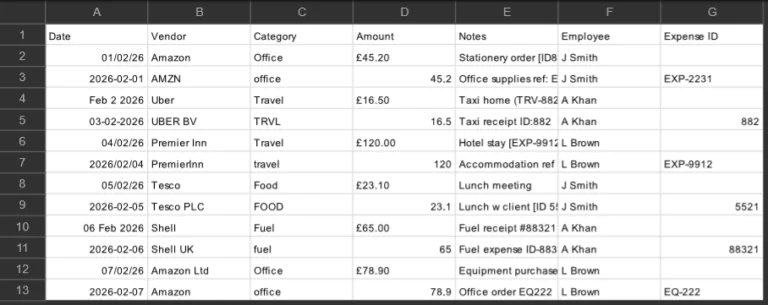
How To Start Learning Excel – Methods That Work
Contents

Microsoft Excel is still one of the most powerful and widely-used tools in the business world.
Whether you’re managing budgets, analysing data, or organizing workflows, Excel can streamline and simplify your work.
But getting to grips with all that it offers can be overwhelming – especially if you’re just starting out.
In this article, we’ll explore the best ways to learn Excel, whether you’re a complete beginner or looking to refine your skills. Based on our years of experience in professional Excel training, we’ll guide you through practical and proven learning methods.

1. Start With the Basics
If you’re new to Excel, begin with the fundamentals:
-
Understanding the Excel interface
-
Entering and formatting data
-
Sorting and filtering data
There are many free tutorials online that provide a step-by-step introduction to these core skills, and we have a number of articles on them too. But the key to success is consistent practice.
Use Excel in real-life scenarios: manage your personal budget, track goals, or organize household chores.
The more you use it, the more confident you’ll become.
Why Excel Is Still Relevant
Despite the rise of new tools, Excel remains one of the most relied-upon applications in the workplace.
It’s used in everything from financial modelling and data analysis to reporting, planning, and automation, and it’s not going away any time soon.
One thing we hear all the time from our delegates is “I thought I knew Excel, but I had no idea it could do this”.
Features like dynamic arrays, advanced formulas, Power Query, and PivotTables are game-changers once you learn to use them properly.
Excel continues to evolve and grow more powerful. For professionals in almost any role, developing stronger Excel skills is one of the most practical and rewarding investments you can make.

2. Take An Instructor-Led Excel Course
For structured learning, a classroom or virtual Excel course is one of the most effective options. Experienced instructors can guide you through complex topics like:
-
VLOOKUP, INDEX-MATCH, and nested IF statements
-
PivotTables and PivotCharts
-
Conditional formatting
-
Excel dashboards
Good training courses also offer exercises and real-world scenarios that help solidify learning.
Look for training providers with strong reviews and experienced instructors.
To help you choose the right course, we’ve compared Acuity Training and Happy’s Excel courses – two of London’s leading providers – to see which offers the best professional learning experience in 2025.
3. Use Microsoft’s Built-In Help and Templates
Microsoft Excel itself offers a range of built-in tools to help you learn:
-
The “Tell Me” search bar lets you find and apply features instantly
-
Templates for budgets, calendars, and project tracking
-
The Microsoft Support site offers detailed guides and how-tos
Using these resources can help you discover new features and reinforce what you’ve learned.
4. Solve Real-World Problems
Learning Excel is more effective when you apply it to real problems. Try projects like:
-
Building a personal finance tracker
-
Creating an inventory list with conditional formatting
-
Developing a data dashboard for work reports
By solving actual problems, you’ll deepen your understanding and retain information longer. You’ll also build a portfolio of skills that’s directly relevant to your job or personal goals.
5. Join Excel Communities and Forums
Engaging with other learners and professionals can fast-track your growth. Online communities like MrExcel, Reddit’s r/excel, and Stack Overflow allow you to:
-
Ask questions and get expert answers
-
Learn from others’ challenges and solutions
-
Discover tips and tricks shared by power users
By contributing to these communities, you not only learn more – you also demonstrate your commitment to mastering Excel.
Final Thoughts
There’s no one-size-fits-all approach to learning Excel. What matters most is that you start with the basics, stay consistent, and challenge yourself with real tasks. Whether you prefer video tutorials, formal courses, or self-guided projects, Excel is a skill that rewards regular use and curiosity.
By using the resources outlined above – and sticking with it – you’ll soon find yourself navigating Excel with confidence and efficiency.
- Facebook: https://www.facebook.com/profile.php?id=100066814899655
- X (Twitter): https://twitter.com/AcuityTraining
- LinkedIn: https://www.linkedin.com/company/acuity-training/





